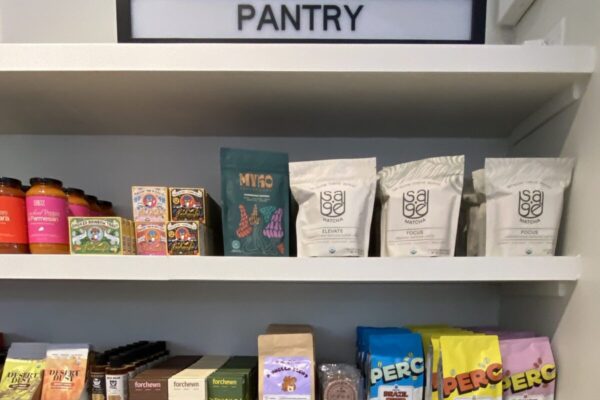More brand, less celebrity
Brands that could survive without big name backings

There’s a special kind of paradox at the intersection of celebrity and branding. Fame, especially when wielded as an endorsement, is a shortcut: a fast-track to relevance, a built-in audience, a persistent spotlight that attracts attention before it might be justified. Brand building, on the other hand, should be methodical and deep—a process where company principles are aligned, positioning is coordinated, a name is selected, and messaging is honed. Let’s take as given that thoughtful, solid branding shouldn’t collapse without a promotional personality or a dash of starpower.
Celebrity endorsement is not a new phenomenon—Pliny the Elder references gladiators “endorsing” medicinal and grooming items in his Naturalis Historia. But in the current multimedia marketing landscape, something more subtle is unfolding. There is a generation of celebrity brands that feel decidedly brand-first—the name, the products, and the overarching brand outshine the celebrity’s name and notoriety. These endeavors aren’t just side hustles in search of distribution. They’re attempts to carefully build businesses with longevity and cultural impact that can live on even if the celebrities take some time off or step away altogether. Let’s look at some celebrities who are fostering companies and products sturdy enough to outlast their fame.

Take Houseplant, Seth Rogen’s handsome, hazy ode to cannabis and ceramics. It’s a name that speaks to a quiet, personal, domestic-kind-of cannabis consumption. By his own account, Rogen has been very hands-on with cannabis and the various contraptions used to consume it and dispose of its byproducts. Having likely smoked his 10,000 flowers, he has an expert perspective that guides the design and crafting of ash trays, stash jars, strain-specific curated LP box sets, and other ephemera. The company name doesn’t make any literal reference to Rogen’s personal name, but it captures his gentle spirit, his natural growth, and his playful co-habiting with cannabis. It’s funny to ponder that maybe a decade from now, some partakers may not know anything about Pineapple Express (the movie), Superbad, or Knocked Up, but they might still be using the charming ceramics made by the brand started by that guy who used to be a famous actor—no, seriously dude.

A Rare Beauty is someone or something exceptional that impresses beyond the status quo for contemporaneous standards. Selena Gomez derived this name from the title of her 2020 album Rare, which she has identified as one of the most honest and vulnerable works of her career. “It’s a huge part of why I named my album Rare – because there’s so much pressure to look the same as everyone else.” The word “rare” became a personal mantra for Gomez—expressing a sense of self-worth not based on comparison or perfection. Rare Beauty uses the word to reclaim part of the beauty industry, empowering people to focus on their unique characteristics, individuality, and self-acceptance. Gomez also verified that the name was not picked just for aesthetics or brand appeal, but to make a point: beauty should be about being yourself, not achieving a filtered ideal. “We live in a time where everything is based on your looks and social media… I want to represent a person that is just saying ‘You are who you are; you’re unique and you’re rare.’” By choosing not to imbue the line with her personal name—but with her attitude and artistic flair—Gomez doubles down on an inclusive and considerate brand ethos, giving the company plenty of space to flourish.

Steph Curry’s Gentleman’s Cut references his (usually) gracious demeanor and skill set, but doesn’t milk the metaphor—it’s a whiskey with its own rhythm, not just a superficial cashout. There’s a quiet cleverness to Curry’s bourbon label, its double meaning references his well-mannered behavior and a signature basketball move that can leave opponents off balance or on the ground—a little like bourbon? The label feels set up to survive even without Curry’s likeness. The brand’s visual language—muted blacks, gold type, not a glimpse of basketball iconography—seems focused on the long game. The product team wants to earn its place on bar carts and top shelves, alongside other notable smallbatch offerings. If Curry “does a fadeaway” someday into a more subtle private life, Gentleman’s Cut might well remain a whiskey with fans of its own.

Fabletics could have easily been another flippant celeb-athleisure collab. Instead, it developed a unique membership model with loyal customers and a strong data-driven strategy. Launched in 2013 with Kate Hudson as co-founder, the brand has grown into a massive fashion and fitness ecosystem with more than 3 million active VIP members. While Hudson lent charisma to the brand early on, Fabletics hasn’t used her face in every campaign. As the company name—short for “fabulous athletic wear”—doesn’t use any part of Hudson’s name or personal story, it can focus its energy on empowering (and marketing to) active people while creating new products based on their direct feedback. Hudson has been excited to be a part of the brand as she leads “a very active life and…wanted to motivate others to be active and enjoy it.” Should she ever have less time for the business, it seems like their inclusive product line and engaged community will be enough to keep things moving without her celebrity.

Pharrell Williams is a music and fashion icon with 13 Grammy Awards on the mantle and design experience with Chanel, Adidas, and Louis Vuitton. So it might follow that his skincare brand would sound polished, maybe profound. Humanrace demonstrates his philosophical approach to skin and bodycare that goes beyond the mere aesthetic. The name evokes shared identity and evolutionary kinship, elevating the brand and showing a more centered tone than something like Billionaire Boys Club, an earlier and implicitly ironic brand name from Pharrell and fashion designer Nigo. Humanrace began with a minimalist, gender-neutral skincare offering that emphasized ritual and intention. Pharrell’s face appears only on the “About Us” page of the Humanrace site, where the brand’s chief dermatologist Dr. Elena Jones is featured with equal representation. Pharrell told GQ UK, “the name itself – notice there’s no space between Human and Race – that symbolises that we’re bridging a gap and making it inclusive…Humanrace is a movement.” Together, Pharrell and Dr. Jones intentionally formulated the vegan product line, and sought out natural ingredients like plant peptides and mushroom extracts when possible. Humanrace has grown naturally from the ground up—if it ever has to continue without Pharrell “in the lab,” the brand would seemingly still flourish.

In a beauty landscape laden with euphemism and pretense, Stripes says what others won’t: aging is natural, your body changes, and tending to those changes is healthy. Created by Naomi Watts, Stripes doesn’t wrap the experience of aging in veils of “graceful transitions” or vague “wellness journeys.” It conjures a name for those moments—changes in collagen levels, hormones, skin, wrinkles, dryness, fine lines—then meets it, face to face. The name is a clever, earnest metaphor: Stripes suggests marks of experience, natural changes, and indicators of a life well lived. To hit one’s early 50s without smile lines or some “patina of life” suggests having missed out on something along the way. Watts speaks openly about her own struggles with perimenopause and hopes to de-stigmatize that phase of life. “We’ve been through ups and downs, we’ve recovered, we’re wiser for that, we’re stronger, we should embrace this moment in our lives in a positive way, as if we’ve earned this moment—we’ve earned our stripes,” Watts said in an interview. Designed with menopause experts and scientists, Stripes offers hormone-safe serums, hydration support, and vulva care, all in subtle, modern packaging. While Watts remains present as founder and chief creative officer, the brand feels set to age gracefully with or without her. Stripes has done an excellent job of normalizing menopause and supporting women. It seems primed to go far beyond a celebrity endorsement—albeit a personal and committed one.
These brands reveal something uncommon in the current celebrity business ecosystem: humility. Not in the sense of shrinking away from influence or spotlight, but in the way they channel fame toward personally meaningful projects that stand to make a broad, self-sustaining impact. In each case, the celebrity plays an important, grounding early role, but ultimately is able to recede behind the brand names, products, or missions that can speak for themselves. These kinds of brands are particularly strong when celebrity involvement isn’t performative, but principled. They bring their point of view and enthusiasm to the project and let the businesses follow through with consistency in product and purpose. Whether manifesting some personal indulgence, self-acceptance, active encouragement, quiet humanism, or graceful aging with these ventures, it seems like even if the stars fade, the brands will shine.
All imagery courtesy of Unsplash.com

